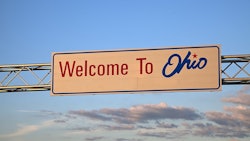
As state regulators continue evaluating processing and testing license applications ahead of the anticipated Sept. 8 medical marijuana launch date, Ohioans are getting ready to see cannabis businesses show up in their communities. Some are even considering joining the Green Rush.
A dozen of those cannabis industry hopefuls attended Ohio’s first Marijuana Business Association (MJBA) meeting in the east suburbs of Cleveland on June 12, hoping to glean more insight into the state’s nascent medical cannabis market.
David Rheins, MJBA’s founder and president, hosted the evening event and organized a list of panelists to speak on the different aspects and the potential of the Buckeye State’s market.
“I’m excited about Ohio,” Rheins said after the meeting. “As a Midwesterner, for me, this is the last mile … [of] the breadbasket of America, the conservative Bible Belt: Indiana, Ohio, Kentucky, Illinois, Michigan. These are the states that embody traditional American values.”
Rheins leaned heavily on the notion that the cannabis industry not only needs to unite internally, but also must connect with communities at large. He highlighted Ohio as a state that could swing the federal pendulum: “My perspective is the greatest hurdle to legalization is … the integration of cannabis and cannabis users into the mainstream. The battle in the Midwest is the final frontier.”
Here are three other takeaways from the inaugural MJBA-Cleveland meeting.
1. Appeals are rarely worth your time.
As a free piece of legal advice, Steven Baden, an attorney with the Myers, Roman, Friedberg & Lewis law firm in Cleveland, told the audience most applicants should not to waste time, money and energy on contesting how a state awards cannabis licenses.
In his presentation, Baden reviewed how Ohio awarded the limited licenses and the Ernst & Young report validating the state’s process. Other businesses have appealed the licensing process on similar grounds in other states and nearly all ended in failure. That’s why he didn’t join the crowd of applicants who didn’t qualify for cultivation licenses after his got turned down.
In the end, all that is going to happen is “you’ll blow a lot of money on lawyers,” he said.
2. Thousands of jobs are going to be created.
Ohio’s cannabis licensees are going to create thousands of jobs in their communities, said Michelle Blank, owner Mary Jane Agency, a cannabis staffing company that matches prospective employees with employers looking for particular skill sets.
Ohio’s processing and testing facilities will be the biggest employment drivers in the Buckeye State’s cannabis program, as Blank projected those companies will employ between 35-60 people each. And those will be good paying jobs as they will often require science degrees.
3. It’s not just the licensees that have the opportunity.
The cannabis market is full of innovation, said Michael O’Malley, owner and creator of Curved Papers, especially in ancillary products and services.
O’Malley told the story of how he came up with Curved Papers—a rolling paper with curved edges to make “tucking” your joint easier—and innovated in an industry that has remained mostly unchanged for the last 500 years. “Rolling papers that you buy today are being made in the same region of Southern France and Northern Spain that they’ve been made since their inception,” O’Malley said.
He stressed that even if a market is established, there is always room to innovate. “If you have differentiation, the money is there.”
Top photo by Brian MacIver


























